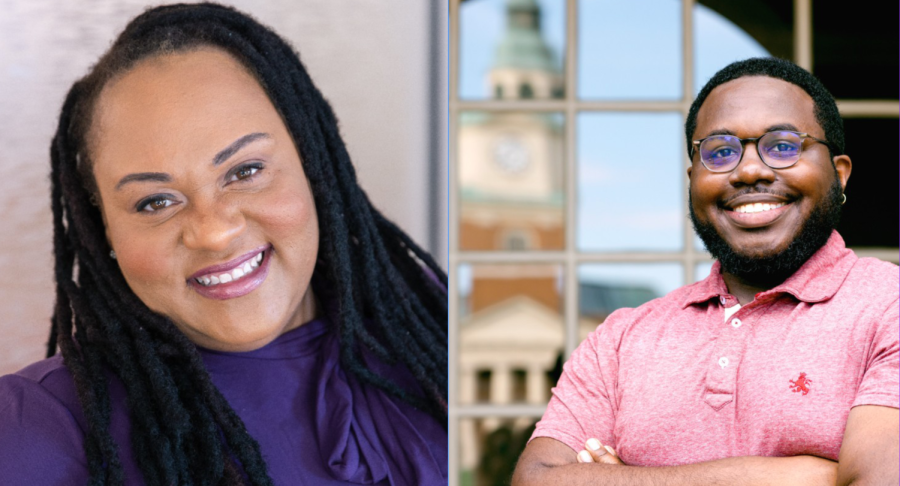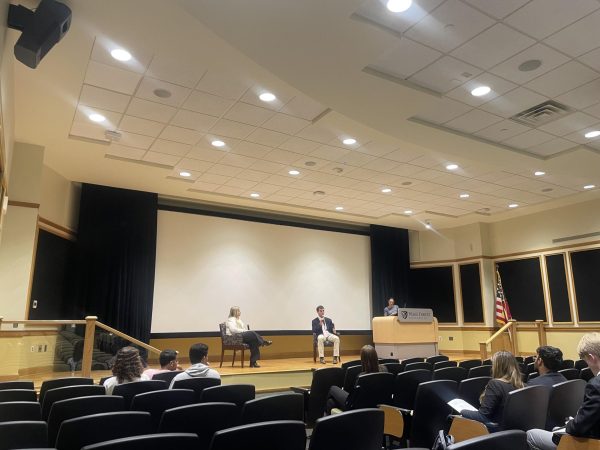University names new director, assistant director of the Intercultural Center
Director Monique Gore and Assistant Director Jalen Shell both began work this month
Monique Gore (left) and Jalen Shell (right) will seek to improve Wake Forest in their roles as director and assistant director of the Intercultural Center, respectively.
July 27, 2022
When the fall semester kicks off, there will be two new faces leading the Intercultural Center.
Director Monique Gore and Assistant Director Jalen Shell began work in their new positions on July 12 and 6, respectively.
Prior to this position, Gore worked at the Office of Multicultural Engagement at Gettysburg College for the past six years. Her most recent position was Interim Executive Director of the office. At Gettysburg, Gore worked on numerous projects.
“[I worked on] co-curricular programming and development of Heritage Months, advising student clubs/organizations, partnering with faculty/staff to create programming, alumni engagement/networking opportunities for students, fundraising with development to create funds for student support services [and I] developed and maintained support for four strategic funding areas of student financial support,” Gore said.
For the past three years, Shell worked as the Coordinator of Multicultural Programming and Academic Program for Excellence at Iowa State University. There, he planned and promoted various events to increase diversity, equity and inclusion on campus. Along with facilitating heritage months, Shell was instrumental in a series called Power Hour — an event for conversations surrounding multicultural student experiences at predominantly white institutions.
“[We focused on] great conversation pieces for students to take, or conversations that they have with their friends, and put some of these things in practice in the classroom, in their personal life and in their social life,” Shell said. “So that as things happen, they can have that solid foundation to make adjustments or have conversations or develop a system of response.”
Gore is excited to work alongside Shell and others in the Intercultural Center to promote improvements and strengthen its impact.
“I’m excited to work with Jalen Shell, [Assistant Director] Savannah Baber and [Administative Assistant] Courtney Milhouse,” Gore said. “The whole team has been a part of the search process, and the team is ready to continue the legacy of the IC. Our goal is to refine our exceptional work and address the community’s evolving needs for the future.”
I desire the IC to serve as a space for students to exist in their identities with no barriers or questions
— Monique Gore, Director of the Intercultural Center
During their time at Wake Forest, both Gore and Shell plan to integrate knowledge and information from their previous positions.
“[In] thinking about my experiences and what I’ve learned in my tenure and previous employment before coming into Wake Forest, [I am thinking about] how we blend some of the things that I found to be successful with things that have been successfully done at Wake Forest and how can we continue to grow some of those efforts collectively,” Shell said.
For events, Gore hopes for them to be intersectional in order to have the largest impact possible.
“For example, if we’re developing heritage month: we want to seek out programming from across campus and see how we can collaborate to maximize engagement and save on cost,” Gore said. “We also want to highlight student-centered events with the potential of engaging other stakeholders like staff and alumni. Therefore, your heritage month has some social events, co-curricular events, and alumni engagement/ networking opportunities — something for everyone with everyone contributing.”
One of Shell’s primary goals is to increase awareness of multicultural student experiences at predominantly white institutions and ensure they are properly represented.
“I want to make sure that they are not an afterthought when it comes to policy or things in place,” Shell said. “But also the understanding of cultural background and cultural differences as it relates to cultural conflicts. We have people that come from all over the world in different walks of life that come to one specific place to better themselves and gain an education, but they don’t have to eliminate the elements that make them who they are in order to be in a certain space.”
Shell hopes to “promote a space that allows for anybody to come and feel safe and feel like they belong in this space without having to minimize, downgrade or completely turn a blind eye to the things that do make us different.”
Along the same line, Gore hopes that all at Wake Forest can interact with the Intercultural Center in some way.
“The IC is an experience for all (students, faculty, staff, and alumni),” Gore said. “It’s an inclusive and intersectional space. While everyone’s interaction will not be the same, I implore all to connect with us to see how we can serve as a resource to assist them in their journey at Wake Forest.”
In that vein, one of Gore’s main initiatives for the Intercultural Center is for it to remain an open resource for all students at Wake Forest.
“I desire the IC to serve as a space for students to exist in their identities with no barriers or questions,” Gore said. “The IC also can serve as a place for students to engage about questions of culture and identity, which will prepare them for life beyond Wake Forest. The more students that matriculate feel equipped to navigate issues that society tends to stay away from (class, race, gender, sexuality, religion, ability, access, equity, etc.) and how they intersect.”
First, Shell plans to educate himself on everything he can at Wake Forest and become accustomed to the differences compared to his prior position.
“There are some things that are specific to Wake Forest that I have not dealt with in my previous years and previous experience,” Shell said. “So I am really excited to have my hand in a lot of different things that the Intercultural Center does and really learn a lot about the Wake Forest community, what the Wake Forest students really want and how I can be of service to them.”
Gore recognizes the challenges accustomed to being new at Wake Forest.
“Everything is so new and exciting,” Gore said. “The challenge is to take it all in and not be too overwhelmed. Everyone has been amazing as I transition to campus. Enjoying the process and seeing the small but impactful changes over time turns the challenges into exciting opportunities.”
Shell and Gore plan to foster connections with as many students, faculty and staff as possible to ensure he can assist his students in a plethora of different areas.
“Obviously, you may not get to know everybody,” Shell said. “It’s kind of tough to get to know every single person on campus, but I can at least have a form of contact within each office or various offices on campus where our students may find a lot of need. So that as students go through an experience, I can make some references or referrals out to different spaces to some trusted colleagues of mine so that students can be successful as needed.”
Diversity, equity and inclusion will remain in the forefront of Shell’s mind as he makes decisions and takes actions through his new role in the Intercultural Center.
“I’m going to set a standard of acknowledging that diversity, equity and inclusion is an important part of what we intend to do,” Shell said. “If [students] have any questions, they know that the Intercultural Center is where they can come, ask questions and get the answers quickly. But [I am] also thinking about how programs that we host are based in education, leadership, development, cultural competency and awareness — ensuring that students know who we are, the work that we do, how we go about it. Then it’s just finding people to come and engage with us so that we can start building connections that are beneficial throughout [the student’s] tenure at Wake Forest.”
Vice President for Diversity and Inclusion Dr. José Villalba eagerly awaits the opportunity to work alongside Gore and Shell, citing numerous positive elements they bring to the community.
“Both of them have extensive knowledge and experience in higher education, specifically as it pertains to inclusion and equity initiatives and practices,” Villalba said. “They also bring with them an intentionality and compassion for the work, and for engaging with students, staff, faculty, and alums. I look forward to seeing them grow and flourish in their roles, and for the connections they will make across our campus. And I’m grateful to them for choosing to come to Wake and join our community of practitioners, scholars and learners.”






















